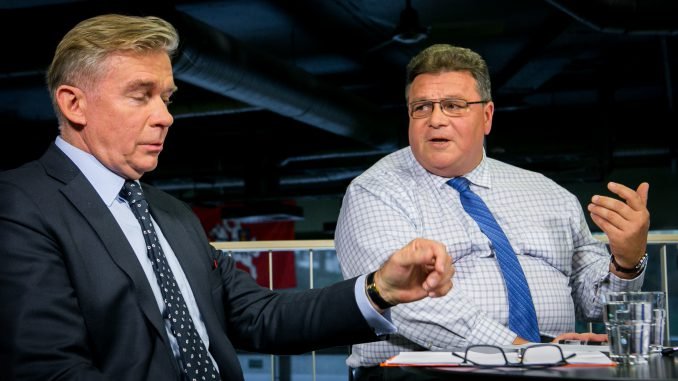
Lithuanian interests are best served through close cooperation with the USA and Poland. This is seen as almost something of an axiom for Lithuanian foreign policy. Incumbent Minister of Foreign Affairs, Social Democrat Linas Linkevičius and former Minister of Foreign Affairs, Conservative Audronius Ažubalis debated Lithuanian Foreign policy in a Delfi “Balsuok 2016” [Vote 2016] debate, focusing on the relations with the two states mentioned.
The relationship Lithuania has and will have with the United States in the future, after the somewhat sensational presidential elections featuring Donald Trump and Hillary Clinton saw the two experts’ opnions divided. While both politicians stressed the crucial role of the US in foreign policy, Linkevičius focused on tradition in the US, expressing belief that regardless of who wins the election in the US, they will likely not cause radical change in US policy, with the candidates being somewhat moderated by party lines. While the Social Democrat focused on tradition, Ažubalis observed that there were profound changes in the United States over the past two decades, with the significance of Asian and Latin American minorities rising to challenge the prevalence of European minorities. With the Asian and South American minorities coming into focus, Ažubalis observed that they are less concerned with the old continent. As such he expressed belief that there is a need to increase interactions, particularly parliamentary diplomacy with the United States. He lamented the lack of interest from member of Seimas in foreign policy and parliamentary diplomacy, with Linkevičius conceding that truly, it was seemingly an impossible mission to generate interest in foreign policy among members of Seimas.
Nevertheless, regardless of election results, Lithuania is likely to retain a close relationship with the United States. Meanwhile relations with Poland have been difficult for quite a few years now. Recently during a discussion in Kaunas, the Director of the Polish Minister of Foreign Affairs’ political council Jan Parys noted that it has become necessary as of late to convince Polish soldiers of why the Baltic States have to be protected and it is a difficult task because supposedly Lithuanian Poles are worse off than those in Belarus currently.
Linas Linkevičius was critical of the Polish official’s statement, pointing out criticisms Parys received on returning home, in the news media. The Minister of Foreign Affairs once again reaffirmed the importance of a strategic partnership with the big neighbour, noting that despite friction, the two states are undertaking a number of joint projects, ranging from creating electrical lines, to gas links, to rail links. Linkevičius finds the oft posed problems to be highlighted artificially, with the Lithuanian Polish community having good conditions in Lithuania, albeit some decisions that could be made, such as writing names in documents in the original language, ended up blocked due to a lack of political will.
A. Ažubalis noted that Lithuania needs to be more supportive of Poland and its EU initiatives, noting an unwillingness in Seimas to create a closer relationship with Poland. Linkevičius points out that the supportiveness has to be wary however where Poland clashes with Brussels. The minister highlighted the case of migrant quotas, something Poland is highly opposed to, stating that Lithuania should not support Poland in such a stance. Meanwhile Ažubalis takes the opposite stance, speaking in support of Lithuania joining Poland in opposing forced migrant quotas.
“I’m not sure if it is as political philosopher Alvydas Jokubaitis says, that Lithuania has turned its back to Visegrad and will end up regretting it, perhaps I wouldn’t use such strong words. It is an emotional observation. But I think that we have to also be there,” noted A. Ažubalis, stressing that Lithuania needs to focus on a multi-vector foreign policy, interacting with Poland and the Scandinavian states, and Germany as well.

Be the first to comment